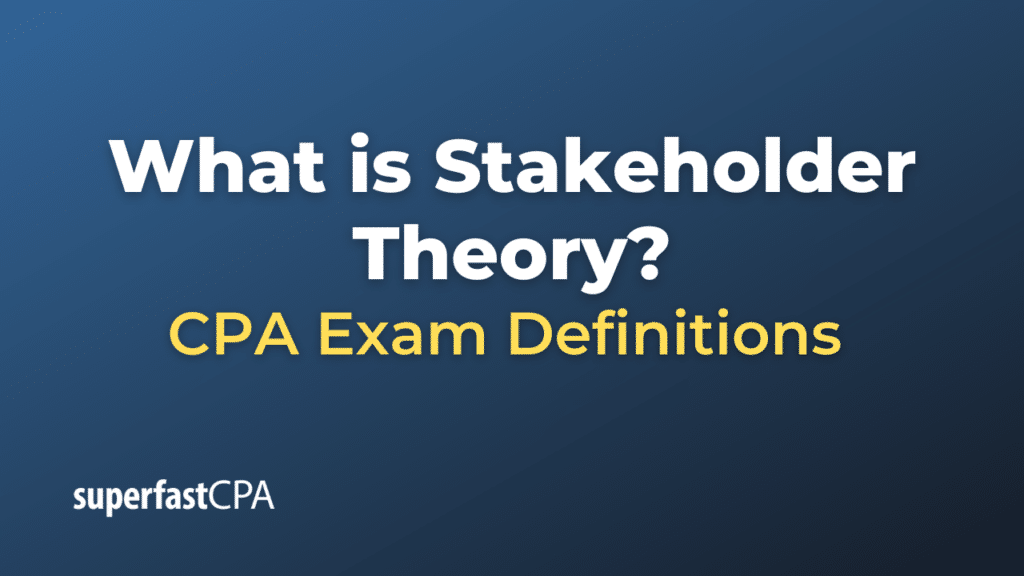Stakeholder Theory
Stakeholder Theory is a framework or perspective within the field of organizational management that emphasizes the importance of considering and addressing the interests of all entities affected by a company’s actions, not just the interests of shareholders. The concept challenges the traditionally dominant shareholder value theory, which posits that a company’s primary duty is to maximize shareholder wealth.
The term “stakeholder” in this context refers to anyone who can affect or is affected by the achievements of a company’s objectives. This can include:
- Shareholders and Investors: The traditional focus of most corporate strategies. They provide capital and expect returns on their investment.
- Employees: Those who work for the company and may be affected by its policies, decisions, and success or failure.
- Customers: The people who buy and use a company’s products or services.
- Suppliers: Companies or individuals who provide resources, materials, or services to the company.
- Community and Society at Large: This can include the local community where the company operates, or broader societal concerns, including environmental concerns.
- Government and Regulators: Entities that create and enforce rules and policies that the company must adhere to.
- Competitors: Other companies in the same industry can also be considered stakeholders because their actions and reactions can influence the environment in which a company operates.
The basic tenets of Stakeholder Theory include:
- All Stakeholders are Valuable: All stakeholders have intrinsic value and the rights of all stakeholders need to be respected.
- Interconnected Interests: The interests of all stakeholders are interconnected. For instance, mistreating employees might lead to lower productivity, which can then impact shareholders.
- Management’s Role: Managers have a fiduciary duty to stakeholders. This implies that managers should consider the rights and interests of all major stakeholders, not just shareholders.
- Harmonization of Interests: Instead of pitting stakeholders against each other, managers should seek strategies that achieve shared objectives and mutual benefits.
- Long-term View: A focus on long-term, sustainable success that benefits all stakeholders rather than short-term gains for a select group.
The Stakeholder Theory was popularized by R. Edward Freeman in his seminal work “Strategic Management: A Stakeholder Approach” published in 1984. The theory has been influential in pushing businesses worldwide to adopt more sustainable and socially-responsible practices.
Example of Stakeholder Theory
Let’s use a hypothetical scenario based on a real-world issue to illustrate the Stakeholder Theory:
Scenario: Tech Company’s New Data Center
A leading tech company, let’s call it “Techtron,” wants to establish a new data center. Such centers require a lot of energy, produce significant heat, and need to be in locations that can handle vast amounts of data traffic.
Stakeholders and Concerns:
- Shareholders and Investors: They want the data center to be cost-effective and to generate profits. A successful data center can improve the company’s stock price and dividends.
- Employees: The data center will generate jobs. Current and potential employees are concerned about job security, working conditions, and wages.
- Customers: They expect fast, reliable, and secure access to the company’s online services. Downtime or slow server response is not acceptable.
- Suppliers: Local businesses and global partners could provide the needed hardware, software, and services. They’re concerned about getting contracts, fair prices, and timely payments.
- Local Community: The data center will use a significant amount of local resources, particularly water for cooling and electricity. There might be concerns about increased traffic, noise, or potential environmental hazards.
- Environmental Groups: Data centers have a considerable carbon footprint. These groups may be worried about the environmental impact, particularly if non-renewable energy sources power the data center.
- Government and Regulators: They’re interested in compliance with local zoning, environmental regulations, and potential tax revenues or incentives given to Techtron.
- Competitors: Other tech companies might be observing the success or failure of this venture, as it can set precedents or create opportunities.
Stakeholder Theory in Action:
Instead of merely seeking the cheapest place to build with the primary aim of maximizing short-term profits, Techtron, following the Stakeholder Theory, would:
- Engage with the local community: This might mean town hall meetings to discuss plans, listen to concerns, and share the potential benefits.
- Invest in renewable energy: Perhaps Techtron decides to build a solar farm or invest in wind energy to offset the carbon footprint of the data center, addressing environmental concerns.
- Provide fair wages and training programs: To ensure they’re not just providing jobs but good quality ones that benefit the community long-term.
- Work with regulators: To ensure all rules are followed and even go beyond the basic requirements to ensure community safety and wellbeing.
- Offer contracts to local suppliers: When possible, giving a boost to the local economy.
By addressing the needs and concerns of all stakeholders, Techtron doesn’t just build a data center; it creates a sustainable, community-supported, and environmentally-friendly operation that aims for long-term success and mutual benefit. This holistic approach can lead to stronger community relations, better risk management, and a more sustainable business model in the long run.













